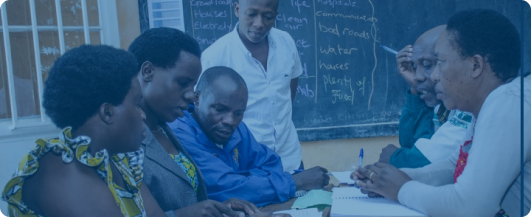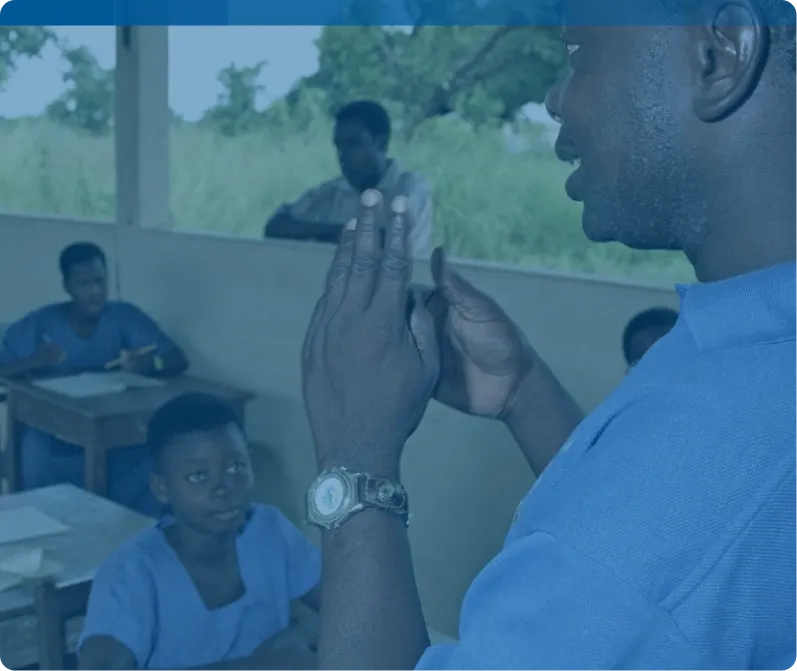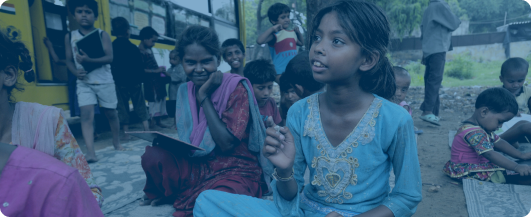Delivery Approaches to Improving Policy Implementation:A Conceptual Framework

Learn how DeliverEd defines delivery approaches and the design choices available to policymakers who wish to use them.
Policy Brief – Delivery Approaches in Crisis or Conflict Situations

This policy brief highlights the profound impact of crises, such as natural disasters, conflicts, or pandemics, on education service delivery and quality, leading to significant learning setbacks, especially among vulnerable children. It emphasizes that delivery approaches, comprising five core functions, serve as institutional mechanisms for enhancing government performance in service delivery and policy implementation.
Policy Brief – Design Choices for Delivery Approaches in Education

This policy brief underscores the importance of delivery approaches, which reshape management functions to prioritize outputs and outcomes over inputs and processes. It emphasizes that these approaches are context-dependent and can be tailored to suit diverse education systems.
Policy Brief – The Challenge of Delivering for Learning

This policy brief outlines how different delivery approaches, referring to the institutional mechanisms or processes adopted by governments, are required to enhance their service delivery and policy implementation performance. The brief highlights how DeliverEd strives to mobilize a vibrant community focused on policy implementation, fostering knowledge exchange, and raising awareness about the imperative for more impactful global endeavors in achieving SDG 4.
A Global Mapping of Delivery Approaches

DeliverEd undertook a systematic global mapping of delivery approaches worldwide. Read our analysis to understand the diversity in delivery approach design.
A Case Study of the Sierra Leone Delivery Unit

The aim of this Sierra Leone policy note, A Case Study of the Sierra Leone Delivery Unit, is to help fill the evidence gap about delivery approaches by creating a better understanding of the practices of the Sierra Leone delivery unit at the Ministry of Basic and Senior Secondary Education. We hope this research is used to support policymakers around the world in how to use delivery approaches to improve policy implementation.
The Accountability Paradox: Delivery Units in Jordan’s Education Sector

This study provides the first historical narrative of the development and evolution of delivery units in Jordan’s education sector between 2010 and 2019. Furthermore, the study investigates the interplay among delivery units, multiple accountabilities, results of reform efforts within this time period, and the political economy factors that either undermined or improved the progress toward the targeted goals.
Command and Can’t Control: An Evaluation of Centralized Accountability in the Public Sector

In this working paper, we explore the large-scale centralized accountability approach to managing education carried out at scale in Punjab, Pakistan. It delves into the challenges of enhancing public services through increased oversight, particularly in addressing measurement and incentive issues inherent to the public sector and examines the effectiveness of a centralized monitoring system as a case study to assess the viability of this approach.
Improving Service Delivery Via Top-Down Data-Driven Accountability: Reform Enactment of the Education Road Map in Pakistan

Driven by the global learning crisis, many countries are adopting approaches to help improve delivery and implementation of education reforms. This paper, Improving service delivery via top-down data-driven accountability: Reform enactment of the Education Road Map in Pakistan, contributes to the gaps in knowledge regarding the ways in which implementation of policy and effective reform solutions can be implemented at scale in the global South
Management and Performance in Mid-Level Bureaucracies: Evidence from Ghanaian Education Districts

This paper studies mid-level bureaucracies: the organizations operating between the national and street levels that are commonly tasked with the implementation of sector plans. Our descriptive evidence points toward benefits from problem-solving practices over top-down accountability, raising policy considerations for Ghana’s current delivery approach and beyond.
How Do Regions, Districts, and Schools Respond to the Introduction of a Delivery Approach? Evidence from Ghana

In 2018, the Ghana Ministry of Education adopted a delivery approach to deliver on the goals of its new 2018–2030 Education Strategic Plan. The approach was led by the National Education Reform Secretariat (NERS) and led to the implementation of national-level policies and better coordination across Ghana’s 17 national agencies, including the Ghana Education Service (GES). This report is focused on the introduction of a delivery approach at the subnational level by the GES with support from the National Education Reform Secretariat between 2021 and 2022. Drawing primarily on qualitative data collected in May and June 2022 in three regions, five districts, and ten primary or junior high schools (JHS) across Ghana, the study explores how Ghana’s delivery approach was received by sub-national-level actors and how new management practices interacted with and changed existing management practices and routines.
The Role of Delivery Approaches in Education Systems Reform: Evidence from a Multi-Country Study

This report synthesizes the findings of a multi-country, multi-team research project into the effectiveness of delivery approaches at improving education service delivery. The main countries studied were Ghana, Jordan, and Pakistan, with smaller studies in Sierra Leone and a soon-to-be-completed study in Tanzania. We also conducted a global mapping of the design and adoption of delivery approaches.
Deliberate Disrupters: Can Delivery Approaches Deliver Better Education Outcomes?

This report summarizes the effectiveness of delivery approaches and proposes a simple, three-part framework to help political leaders, policymakers, and practitioners plan, design, evaluate, and operate delivery approaches more effectively.
System Delivery Overview

The System Delivery transformation is part of the Learning Generation Initiative (LGI), whose mission is to empower the people within and connected to education systems to enable all children to be learning within a generation. This 2-pager outlines the goal of the System Delivery transformation to support education systems to improve delivery through better prioritization, use of data, and problem-solving to achieve learning for all.
Using Delivery Approaches to Improve Public Services: Education Sector Reforms in Tanzania, 2013-2023

This paper examines the question, “Under what conditions can reforms implemented under delivery unit approaches become institutionalized and sustainable?” It analyzes Tanzania’s Big Results Now (BRN) delivery unit, revealing that sustainability was more likely when reforms were integrated into ministry operations or supported by donors, influencing education governance at multiple levels.
Problem-solving in Education Reform: Evidence and Insights for Low- and Middle-income Countries

This paper examines how problem-solving approaches can support education reform in low- and middle-income countries (LMICs). Through case studies from South Africa, Brazil, and Ghana, it highlights the role of adaptive leadership, stakeholder engagement, and data-driven decision-making. The paper identifies knowledge gaps, particularly in sustainability and gender dynamics for further investigation.
Delivery Checklist

This practical checklist supports policymakers in assessing the progress of designing, implementing, and sustaining a delivery approach in education systems. Used alongside the delivery toolkit, it provides a structured framework to identify gaps, align priorities, and ensure long-term impact on learning outcomes.
Delivery Toolkit

This toolkit provides practical guidance for policymakers to design, implement, and sustain delivery approaches that tackle education system challenges. Featuring insights from DeliverEd, real-world examples, and actionable tools, it offers a clear framework to drive measurable progress and lasting impact in low- and middle-income countries.
